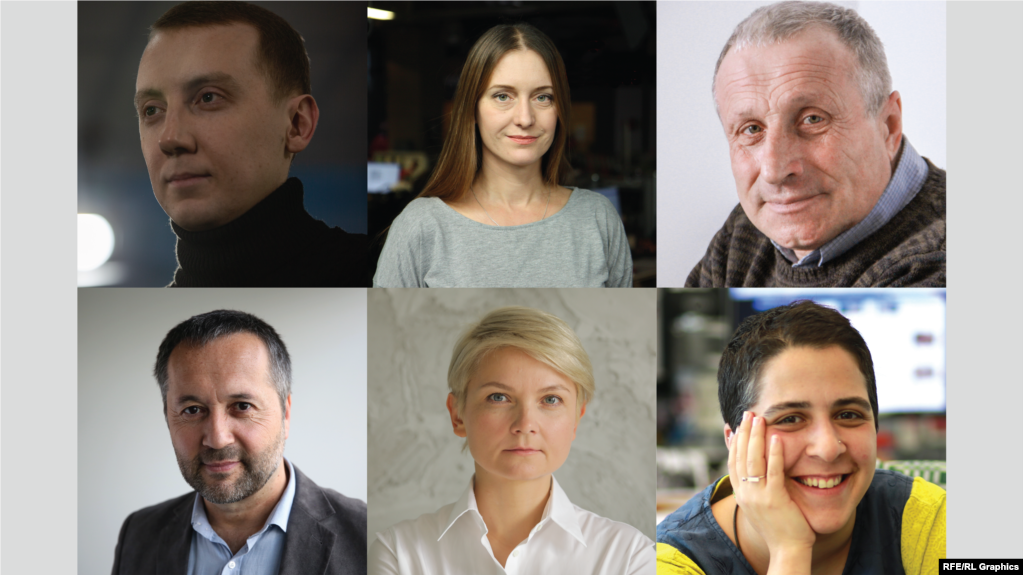On World Press Freedom Day, Coronavirus Multiplies Challenges Facing Independent Media
“Today the state has a new ‘stick’ – ‘fake news’ about the coronavirus,” says journalist Svetlana Prokopyeva, a contributor to Radio Free Europe/Radio Liberty’s (RFE/RL) Russian Service.

WASHINGTON, D.C. — “Today the state has a new ‘stick’ – ‘fake news’ about the coronavirus,” says journalist Svetlana Prokopyeva, a contributor to Radio Free Europe/Radio Liberty’s (RFE/RL) Russian Service, who has been charged with promoting terrorism in a case decried by international rights monitors. Prokopyeva, in remarks on World Press Freedom Day, was referring to the ways that the Russian government – and countless others – is exploiting the coronavirus outbreak to tighten controls over information and the independent press.
“On any given day, our journalists are among the bravest in the business, working in some of the toughest environments anywhere,” said RFE/RL President Jamie Fly. “But the coronavirus pandemic has multiplied the challenges. We’ve seen governments deploy disinformation and conspiracy theories to confuse the public and discredit the media, and enact new laws and measures to restrict our reporting, which our audiences rely to protect their families and keep their communities safe. Our journalists have responded to this challenge with courage and a dogged determination to provide our audiences with the facts they need to navigate this difficult period,” Fly said.
In Russia, new measures have added to now-standard pressures for journalists, while new threats have targeted individual reporters. Critics fear that a law passed on April 1 criminalizing “fake news” about the coronavirus can be used to censor critical reporting or silence journalists whom authorities dislike. (Similar legislation exists in countries such as Iran and Kazakhstan and is under consideration in Bulgaria.) Meanwhile, the Russian State Duma commission on foreign interference announced last month that content published by RFE/RL could be subject to review. Chechen strongman Ramzan Kadyrov has directly threatened the director of RFE/RL’s North Caucasus Service over an article related to the region’s response to the coronavirus. An RFE/RL reporter in St. Petersburg was questioned by local prosecutors after she published an interview with a veteran emergency room doctor claiming “forced euthanasia” and catastrophic conditions in a local hospital.
The threats exploit the coronavirus, but add to a steady stream of measures enacted over decades by Russian authorities to restrict media freedom, including most recently the notorious 2016 “Yarovaya” legislation on terrorist and extremist activity, and “foreign agent” legislation passed in 2017 and expanded last December to apply to individuals. As part of the USAGM Press Freedom Film Festival, which opens today, RFE/RL is screening an English-language version of the Russian film Let It All Burn, by acclaimed journalist Andrei Loshak and the 24/7 Russian-language network Current Time, which documents a banned concert in Russia to illustrate the state’s relentless attack on free speech
The coronavirus has not deterred the Tajik government from its year-long refusal to accredit local RFE/RL journalists, who, despite declining staff numbers and the risk to themselves of infection, have raced to provide the public with essential health guidance and pandemic-related news coverage amid government inaction and an information void.
While Belarus’s denial of the coronavirus, which President Alyaksandr Lukashenka has called a “psychosis,” poses a risk to journalists who report any positive cases, a veteran RFE/RL reporter in Minsk pointed to years of media harassment and said the country’s independent journalists have long been “vaccinated from fear.”
Journalists with RFE/RL’s Iranian Service, known as Radio Farda, say that reporting on the coronavirus is part of a bigger challenge, since every story — beginning in 2020 with mass protests over gasoline prices, the killing of Islamic Revolutionary Guard Commander Qasim Soleimani, and the downing of a Ukrainian airliner — is an exercise in countering official lies, debunking conspiracy theories, and digging for the truth.
Audiences have responded resoundingly to RFE/RL reporting, demonstrating increasing demand for its coronavirus coverage even as the pressures facing journalists multiply. Compared to the previous month, visits in March to RFE/RL websites and apps increased 48% to 77 million, page views were up by 43% to 128.5 million, and unique visitors increased 50% to 33.5 million. Spikes were similarly registered on social media platforms, with video views on Facebook rising by 44% to 351 million, and views on YouTube increasing by 18% to 144.5 million. RFE/RL also saw spectacular growth on Instagram — particularly in Persian, Uzbek, and Tajik — with a 46% jump in video views to 67.5 million for the month.
For more information, contact press@rferl.org.
###
About RFE/RL
Radio Free Europe/Radio Liberty (RFE/RL) is a private, independent international news organization whose programs — radio, Internet, television, and mobile — reach influential audiences in 23 countries, including Russia, Ukraine, Iran, Afghanistan, Pakistan, the republics of Central Asia and the Caucasus. It is funded by the U.S. Congress through USAGM.